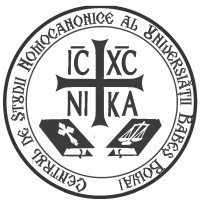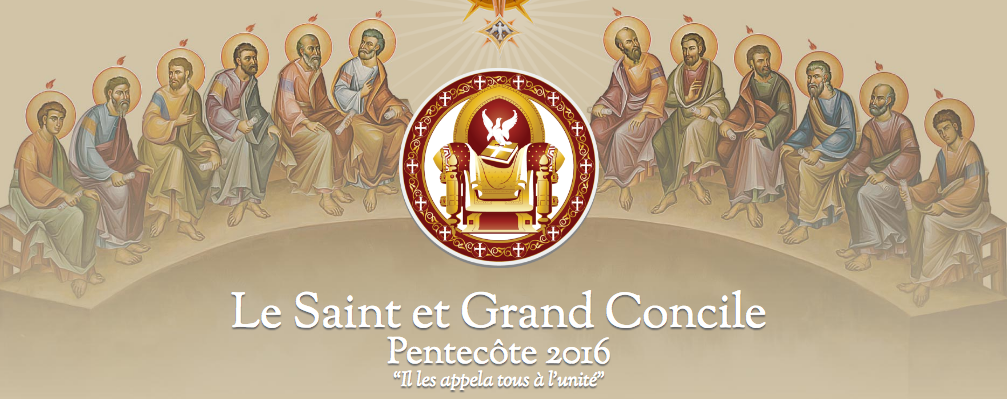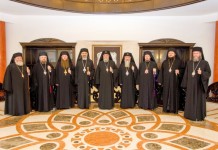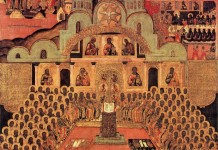English Ελληνικά

RELATIONS OF THE ORTHODOX CHURCH WITH THE REST OF THE CHRISTIAN WORLD
- The Orthodox Church, as the One, Holy, Catholic, and Apostolic Church, in her profound ecclesiastical self-consciousness, believes unflinchingly that she occupies a central place in the matter of the promotion of Christian unity in the world today.
- The Orthodox Church founds the unity of the Church on the fact of her establishment by our Lord Jesus Christ, and on the communion in the Holy Trinity and in the sacraments. This unity is expressed through the apostolic succession and the patristic tradition and is lived out in the Church up to the present day. The Orthodox Church has the mission and duty to transmit and preach all the truth contained in Holy Scripture and Holy Tradition, which also bestows upon the Church her catholic character.
- The responsibility of the Orthodox Church for unity as well as her ecumenical mission were articulated by the Ecumenical Councils. These stressed most especially the indissoluble bond between true faith and sacramental communion.
- The Orthodox Church, which prays unceasingly “for the union of all,” has always cultivated dialogue with those estranged from her, those both far and near. In particular, she has played a leading role in the contemporary search for ways and means to restore the unity of those who believe in Christ, and she has participated in the Ecumenical Movement from its outset, and has contributed to its formation and further development. Moreover, the Orthodox Church, thanks to the ecumenical and loving spirit which distinguishes her, praying as divinely commanded that all men may be saved and come to the knowledge of the truth (1 Tim 2:4), has always worked for the restoration of Christian unity. Hence, Orthodox participation in the movement to restore unity with other Christians in the One, Holy, Catholic and Apostolic Church is in no way foreign to the nature and history of the Orthodox Church, but rather represents a consistent expression of the apostolic faith and tradition in a new historical circumstances.
- The contemporary bilateral theological dialogues of the Orthodox Church and her participation in the Ecumenical Movement rest on this self-consciousness of Orthodoxy and her ecumenical spirit, with the aim of seeking the unity of all Christians on the basis of the truth of the faith and tradition of the ancient Church of the Seven Ecumenical Councils.
- In accordance with the ontological nature of the Church, her unity can never be perturbed. In spite of this, the Orthodox Church accepts the historical name of other non-Orthodox Christian Churches and Confessions that are not in communion with her, and believes that her relations with them should be based on the most speedy and objective clarification possible of the whole ecclesiological question, and most especially of their more general teachings on sacraments, grace, priesthood, and apostolic succession. Thus, she was favorably and positively disposed, both for theological and pastoral reasons, towards theological dialogue with other Christians on a bi-lateral and multi-lateral level, and towards more general participation in the Ecumenical Movement of recent times, in the conviction that through dialogue she gives a dynamic witness to the fullness of truth in Christ and to her spiritual treasures to those who are outside her, with the objective aim of smoothing the path leading to unity.
- In this spirit, all the local Most Holy Orthodox Churches participate actively today in the official theological dialogues, and the majority of these Churches also participate in various national, regional and international inter-Christian organizations, in spite of the deep crisis that has arisen in the Ecumenical Movement. This manifold activity of the Orthodox Church springs from a sense of responsibility and from the conviction that mutual understanding and cooperation are of fundamental importance if we wish never to „put an obstacle in the way of the gospel of Christ (1 Cor 9:12).
- Certainly, while the Orthodox Church dialogues with other Christians, she does not underestimate the difficulties inherent in this endeavor; she perceives these difficulties, however, on the path towards toward a common understanding of the tradition of the ancient Church and in hope that the Holy Spirit, Who “welds together the whole institution of the Church, (Sticheron at Vespers of Pentecost), will „make up that which is lacking” (Ordination Prayer). In this sense, the Orthodox Church in her relations with the rest of the Christian world, relies not only on the human efforts of those involved in dialogue, but especially on the guidance of the Holy Spirit in the grace of the Lord, who prayed “that…all may be one” (Jn 17:21).
- The contemporary bilateral theological dialogues, announced by the Pan-Orthodox meetings, express the unanimous decision of all local most holy Orthodox Churches who are called to participate actively and continually in them, so that the unanimous witness of Orthodoxy to the glory of the Triune God may not be hindered. In the event that a certain local Church chooses not to assign a representative to a particular dialogue or one of its sessions, if this decision is not pan-Orthodox, the dialogue still continues. Prior to the start of the dialogue or of the session, the absence of any local Church ought to be discussed at all events by the Orthodox Committee of the dialogue to express the solidarity and unity of the Orthodox Church. The bi-lateral and multi-lateral theological dialogues need to be subject to periodical evaluations on a pan-Orthodox level.
- The problems that arise during the theological discussions within Joint Theological Commissions are not always sufficient grounds for any local Orthodox Church unilaterally to recall its representatives or definitively withdraw from the dialogue. As a general rule, the withdrawal of a Church from a particular dialogue should be avoided; in those instances when this occurs, inter-Orthodox efforts to reestablish representational fullness in the Orthodox Theological Commission of the dialogue in question should be initiated. Should one or more local Orthodox Churches refuse to take part in the sessions of the Joint Theological Commission of a particular dialogue, citing serious ecclesiological, canonical, pastoral, or ethical reasons, this/these Church(es) shall notify the Ecumenical Patriarch and all the Orthodox Churches in writing, in accordance with pan-Orthodox practice. During a pan-Orthodox meeting the Ecumenical Patriarch shall seek unanimous consensus among the Orthodox Churches about possible courses of action, which may also include— should this be unanimously deemed necessary—a reassessment of the progress of the theological dialogue in question.
- The methodology followed in the theological dialogues aims at both the resolution of the received theological differences or of possible new differentiations, and to seek the common elements of the Christian faith. This process requires that the entire Church is kept informed on the various developments of the dialogues. In the event that it is impossible to overcome a specific theological difference, the theological dialogue may continue, recording the disagreement identified and bringing it to the attention of all the local Orthodox Churches for their consideration on what ought to be done henceforth.
- It is clear that in the theological dialogues the common goal of all is the ultimate restoration of unity in true faith and love. The existing theological and ecclesiological differences permit, however, a certain hierarchical ordering of the challenges lying in the way of meeting this pan-Orthodox objective. The distinctive problems of each bilateral dialogue require a differentiation in the methodology followed in it, but not a differentiation in the aim, since the aim is one in all the dialogues.
- Nevertheless, it is essential if necessary for an attempt to be made to coordinate the work of the various Inter-Orthodox Theological Committees, bearing in mind that the existing unity of the Orthodox Church must also be revealed and manifested in this area of these dialogues.
- The conclusion of any official theological dialogue occurs with the completion of the work of the relevant Joint Theological Commission. The Chairman of the Inter-Orthodox Commission then submits a report to the Ecumenical Patriarch, who, with the consent of the Primates of the local Orthodox Churches, declares the conclusion of the dialogue. No dialogue is considered complete before it is proclaimed through such a pan-Orthodox decision.
- Upon the successful conclusion of the work of any theological dialogue, the pan-Orthodox decision about the restoration of ecclesiastical communion must, however, rest on the unanimity of all the local Orthodox Churches.
- One of the principal bodies in the history of the Ecumenical Movement is the World Council of Churches (WCC). Certain Orthodox Churches were among the Council’s founding members and later, all the local Orthodox Churches became members. The WCC is a structured inter-Christian body, despite the fact that it does not include all non-Orthodox Christian Churches and Confessions. At the same time, there are other inter-Christian organizations and regional bodies, such as the Conference of European Churches, the Middle East Council of Churches and the African Council of Churches. These, along with the WCC, fulfill an important mission by promoting the unity of the Christian world. The Orthodox Churches of Georgia and Bulgaria withdrew from the WCC, the former in 1997, and the latter in 1998. They have their own particular opinion on the work of the World Council of Churches and hence do not participate in its activities and those of other inter-Christian organizations.
- The local Orthodox Churches that are members of the WCC participate fully and equally in the WCC, contributing with all means at their disposal to the advancement of peaceful co-existence and co-operation in the major socio-political challenges. The Orthodox Church readily accepted the WCC’s decision to respond to her request concerning the establishment of the Special Commission on Orthodox Participation in the World Council of Churches, which was mandated by the Inter-Orthodox Conference held in Thessaloniki in 1998. The established criteria of the Special Commission, proposed by the Orthodox and accepted by the WCC, led to the formation of the Permanent Committee on Consensus and Collaboration. The criteria were approved and included in the Constitution and Rules of the World Council of Churches.
- Remaining faithful to her ecclesiology, to the identity of her internal structure, and to the teaching of the ancient Church of the Seven Ecumenical Councils, the Orthodox Church’s participation in the WCC does not signify that she accepts the notion of the “equality of Confessions,” and in no way is she able to accept the unity of the Church as an inter-confessional compromise. In this spirit, the unity that is sought within the WCC cannot simply be the product of theological agreements, but must also be founded on the unity of faith, preserved in the sacraments and lived out in the Orthodox Church.
- The Orthodox Churches that are members of the WCC regard as an indispensable condition of their participation in the WCC the foundational article of its Constitution, in accordance with which its members may only be those who believe in the Lord Jesus Christ as God and Savior in accordance with the Scriptures, and who confess the Triune God, Father, Son, and Holy Spirit, in accordance with the Nicene-Constantinopolitan Creed. It is their deep conviction that the ecclesiological presuppositions of the 1950 Toronto Statement, On the Church, the Churches and the World Council of Churches, are of paramount importance for Orthodox participation in the Council. It is therefore very clear that the WCC does not by any means constitute a “super-Church.” The purpose of the World Council of Churches is not to negotiate unions between Churches, which can only be done by the Churches themselves acting on their own initiative, but to bring Churches into living contact with each other and to promote the study and discussion of the issues of Church unity. No Church is obliged to change her ecclesiology on her accession to the Council… Moreover, from the fact of its inclusion in the Council, it does not ensue that each Church is obliged to regard the other Churches as Churches in the true and full sense of the term. (Toronto Statement, § 2).
- The prospects for conducting theological dialogues between the Orthodox Church and the rest of the Christian world are always determined on the basis of the canonical principles of Orthodox ecclesiology and the canonical criteria of the already established Church Tradition (Canon 7 of the Second Ecumenical Council and Canon 95 of the Quinisext Ecumenical Council).
- The Orthodox Church wishes to support the work of the Commission on „Faith and Order” and follows its theological contribution with particular interest to this day. It views favorably the Commission’s theological documents, which were developed with the significant participation of Orthodox theologians and represent a praiseworthy step in the Ecumenical Movement for the rapprochement of Christians. Nonetheless, the Orthodox Church maintains reservations concerning paramount issues of faith and order, because the non-Orthodox Churches and Confessions have diverged from the true faith of the One, Holy, Catholic and Apostolic Church.
- The Orthodox Church considers all efforts to break the unity of the Church, undertaken by individuals or groups under the pretext of maintaining or allegedly defending true Orthodoxy, as being worthy of condemnation. As evidenced throughout the life of the Orthodox Church, the preservation of the true Orthodox faith is ensured only through the conciliar system, which has always represented the highest authority in the Church on matters of faith and canonical decrees. (Canon 6 2nd Ecumenical Council)
- The Orthodox Church has a common awareness of the necessity for conducting inter-Christian theological dialogue. It therefore believes that this dialogue should always be accompanied by witness to the world through acts expressing mutual understanding and love, which express the „ineffable joy” of the Gospel (1 Pt 1:8), eschewing every act of proselytism, uniatism, or other provocative act of inter-confessional competition. In this spirit, the Orthodox Church deems it important for all Christians, inspired by common fundamental principles of the Gospel, to attempt to offer with eagerness and solidarity a response to the thorny problems of the contemporary world, based on the prototype of the new man in Christ.
- The Orthodox Church is aware that the movement to restore Christian unity is taking on new forms in order to respond to new circumstances and to address the new challenges of today’s world. The continued witness of the Orthodox Church to the divided Christian world on the basis of the apostolic tradition and faith is imperative.
We pray that all Christians may work together so that the day may soon come when the Lord will fulfill the hope of the Orthodox Churches and there will be „one flock and one shepherd” (Jn 10:16).









